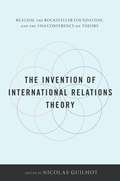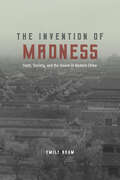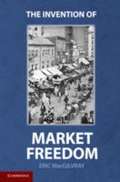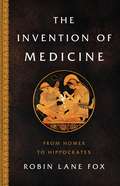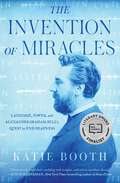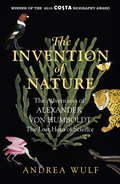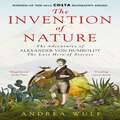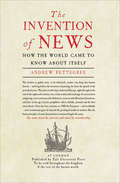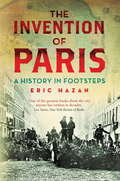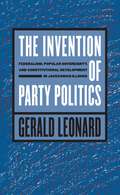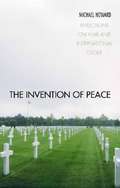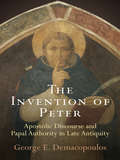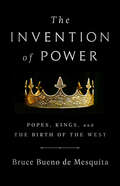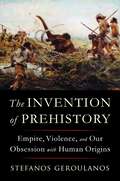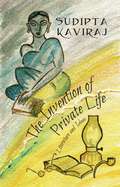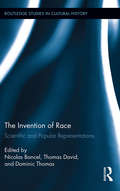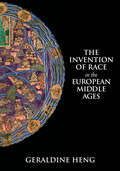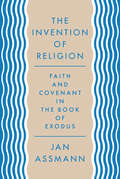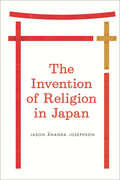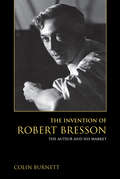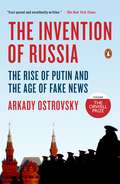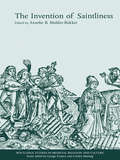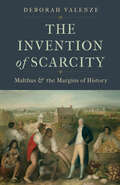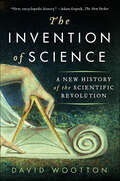- Table View
- List View
The Invention of International Relations Theory: Realism, the Rockefeller Foundation, and the 1954 Conference on Theory
by Nicolas GuilhotThe 1954 Conference on Theory, sponsored by the Rockefeller Foundation, featured a who's who of scholars and practitioners debating the foundations of international relations theory. Assembling his own team of experts, all of whom have struggled with this legacy, Nicolas Guilhot revisits a seminal event and its odd rejection of scientific rationalism.Far from being a spontaneous development, these essays argue, the emergence of a "realist" approach to international politics, later codified at the conference, was deliberately triggered by the Rockefeller Foundation. The organization was an early advocate of scholars who opposed the idea of a "science" of politics, pursuing, for the sake of disciplinary autonomy, a vision of politics as a prerational and existential dimension that could not be "solved" by scientific means. As a result, this nascent theory was more a rejection of behavioral social science than the birth of one of its specialized branches. The archived conversations reproduced here, along with unpublished papers by Hans Morgenthau, Reinhold Niebuhr, and Paul Nitze, speak to this defensive stance. International relations theory is critically linked to the context of postwar liberalism, and the contributors explore how these origins have played out in political thought and American foreign policy.
The Invention of Madness: State, Society, and the Insane in Modern China (Studies of the Weatherhead East Asian Institute)
by Emily BaumThroughout most of history, in China the insane were kept within the home and treated by healers who claimed no specialized knowledge of their condition. In the first decade of the twentieth century, however, psychiatric ideas and institutions began to influence longstanding beliefs about the proper treatment for the mentally ill. In The Invention of Madness, Emily Baum traces a genealogy of insanity from the turn of the century to the onset of war with Japan in 1937, revealing the complex and convoluted ways in which “madness” was transformed in the Chinese imagination into “mental illness.” Focusing on typically marginalized historical actors, including municipal functionaries and the urban poor, The Invention of Madness shifts our attention from the elite desire for modern medical care to the ways in which psychiatric discourses were implemented and redeployed in the midst of everyday life. New meanings and practices of madness, Baum argues, were not just imposed on the Beijing public but continuously invented by a range of people in ways that reflected their own needs and interests. Exhaustively researched and theoretically informed, The Invention of Madness is an innovative contribution to medical history, urban studies, and the social history of twentieth-century China.
The Invention of Market Freedom
by Eric MacgilvrayHow did the value of freedom become so closely associated with the institution of the market? Why did the idea of market freedom hold so little appeal before the modern period and how can we explain its rise to dominance? In The Invention of Market Freedom, Eric MacGilvray addresses these questions by contrasting the market conception of freedom with the republican view that it displaced. After analyzing the ethical core and exploring the conceptual complexity of republican freedom, MacGilvray shows how this way of thinking was confronted with, altered in response to, and finally overcome by the rise of modern market societies. By learning to see market freedom as something that was invented, we can become more alert to the ways in which the appeal to freedom shapes and distorts our thinking about politics.
The Invention of Medicine: From Homer to Hippocrates
by Robin Lane FoxA preeminent classics scholar revises the history of medicine.Medical thinking and observation were radically changed by the ancient Greeks, one of their great legacies to the world. In the fifth century BCE, a Greek doctor put forward his clinical observations of individual men, women, and children in a collection of case histories known as the Epidemics. Among his working principles was the famous maxim "Do no harm." In The Invention of Medicine, acclaimed historian Robin Lane Fox puts these remarkable works in a wider context and upends our understanding of medical history by establishing that they were written much earlier than previously thought. Lane Fox endorses the ancient Greeks' view that their texts' author, not named, was none other than the father of medicine, the great Hippocrates himself. Lane Fox's argument changes our sense of the development of scientific and rational thinking in Western culture, and he explores the consequences for Greek artists, dramatists and the first writers of history. Hippocrates emerges as a key figure in the crucial change from an archaic to a classical world. Elegantly written and remarkably learned, The Invention of Medicine is a groundbreaking reassessment of many aspects of Greek culture and city life.
The Invention of Miracles: Language, Power, and Alexander Graham Bell's Quest to End Deafness
by Katie BoothFinalist for the PEN/Jacqueline Bograd Weld Award for Biography Finalist for the Mark Lynton History Prize&“Meticulously researched, crackling with insights, and rich in novelistic detail&” (Steve Silberman), this&“provocative, sensitive, beautifully written biography&” (Sylvia Nasar) tells the true—and troubling—story of Alexander Graham Bell&’s quest to end deafness.&“Researched and written through the Deaf perspective, this marvelously engaging history will have us rethinking the invention of the telephone.&” —Jaipreet Virdi, PhD, author of Hearing Happiness: Deafness Cures in History We think of Alexander Graham Bell as the inventor of the telephone, but that&’s not how he saw his own career. As the son of a deaf woman and, later, husband to another, his goal in life from adolescence was to teach deaf students to speak. Even his tinkering sprang from his teaching work; the telephone had its origins as a speech reading machine.The Invention of Miracles takes a &“stirring&” (The New York Times Book Review), &“provocative&” (The Boston Globe), &“scrupulously researched&” (Pittsburgh Post-Gazette) new look at an American icon, revealing the astonishing true genesis of the telephone and its connection to another, far more disturbing legacy of Bell&’s: his efforts to suppress American Sign Language. Weaving together a dazzling tale of innovation with a moving love story, the book offers a heartbreaking account of how a champion can become an adversary and an enthralling depiction of the deaf community&’s fight to reclaim a once-forbidden language.Katie Booth has been researching this story for more than fifteen years, poring over Bell&’s papers, Library of Congress archives, and the records of deaf schools around America. But she&’s also lived with this story for her entire life. Witnessing the damaging impact of Bell&’s legacy on her family would set her on a path that overturned everything she thought she knew about language, power, deafness, and the telephone.
The Invention of Nature: The Adventures of Alexander von Humboldt, the Lost Hero of Science: Costa & Royal Society Prize Winner
by Andrea WulfWINNER OF THE 2015 COSTA BIOGRAPHY AWARDWINNER OF THE ROYAL SOCIETY SCIENCE BOOK PRIZE 2016'A thrilling adventure story' Bill Bryson'Dazzling' Literary Review 'Brilliant' Sunday Express'Extraordinary and gripping' New Scientist'A superb biography' The Economist'An exhilarating armchair voyage' GILES MILTON, Mail on Sunday Alexander von Humboldt (1769-1859) is the great lost scientist - more things are named after him than anyone else. There are towns, rivers, mountain ranges, the ocean current that runs along the South American coast, there's a penguin, a giant squid - even the Mare Humboldtianum on the moon. His colourful adventures read like something out of a Boy's Own story: Humboldt explored deep into the rainforest, climbed the world's highest volcanoes and inspired princes and presidents, scientists and poets alike. Napoleon was jealous of him; Simon Bolívar's revolution was fuelled by his ideas; Darwin set sail on the Beagle because of Humboldt; and Jules Verne's Captain Nemo owned all his many books. He simply was, as one contemporary put it, 'the greatest man since the Deluge'.Taking us on a fantastic voyage in his footsteps - racing across anthrax-infected Russia or mapping tropical rivers alive with crocodiles - Andrea Wulf shows why his life and ideas remain so important today. Humboldt predicted human-induced climate change as early as 1800, and The Invention of Nature traces his ideas as they go on to revolutionize and shape science, conservation, nature writing, politics, art and the theory of evolution. He wanted to know and understand everything and his way of thinking was so far ahead of his time that it's only coming into its own now. Alexander von Humboldt really did invent the way we see nature.
The Invention of Nature: The Adventures of Alexander von Humboldt, the Lost Hero of Science: Costa & Royal Society Prize Winner
by Andrea WulfWINNER OF THE 2015 COSTA BIOGRAPHY AWARDWINNER OF THE ROYAL SOCIETY PRIZE 2016'Dazzling' Literary Review 'Brilliant' Sunday Express'Extraordinary and gripping' New Scientist'A superb biography' The Economist'An exhilarating armchair voyage' GILES MILTON, Mail on Sunday Alexander von Humboldt (1769-1859) is the great lost scientist - more things are named after him than anyone else. There are towns, rivers, mountain ranges, the ocean current that runs along the South American coast, there's a penguin, a giant squid - even the Mare Humboldtianum on the moon. His colourful adventures read like something out of a Boy's Own story: Humboldt explored deep into the rainforest, climbed the world's highest volcanoes and inspired princes and presidents, scientists and poets alike. Napoleon was jealous of him; Simon Bolívar's revolution was fuelled by his ideas; Darwin set sail on the Beagle because of Humboldt; and Jules Verne's Captain Nemo owned all his many books. He simply was, as one contemporary put it, 'the greatest man since the Deluge'.Taking us on a fantastic voyage in his footsteps - racing across anthrax-infected Russia or mapping tropical rivers alive with crocodiles - Andrea Wulf shows why his life and ideas remain so important today. Humboldt predicted human-induced climate change as early as 1800, and The Invention of Nature traces his ideas as they go on to revolutionize and shape science, conservation, nature writing, politics, art and the theory of evolution. He wanted to know and understand everything and his way of thinking was so far ahead of his time that it's only coming into its own now. Alexander von Humboldt really did invent the way we see nature.Recorded by arrangement with Doubleday, an imprint of the Knopf Doubleday Publishing Group, a division of Penguin Random House LLC; (P)2015 Highbridge, a division of Recorded Books
The Invention of News: How the World Came to Know About Itself
by Andrew Pettegree&“A fascinating account of the gathering and dissemination of news from the end of the Middle Ages to the French Revolution&” and the rise of the newspaper (Glenn Altschuler, The Huffington Post). Long before the invention of printing, let alone the daily newspaper, people wanted to stay informed. In the pre-industrial era, news was mostly shared through gossip, sermons, and proclamations. The age of print brought pamphlets, ballads, and the first news-sheets. In this groundbreaking history, renowned historian Andrew Pettegree tracks the evolution of news in ten countries over the course of four centuries, examining the impact of news media on contemporary events and the lives of an ever-more-informed public. The Invention of News sheds light on who controlled the news and who reported it; the use of news as a tool of political protest and religious reform; issues of privacy and titillation; the persistent need for news to be current and for journalists to be trustworthy; and people&’s changing sense of themselves and their communities as they experienced newly opened windows on the world. &“This expansive view of news and how it reached people will be fascinating to readers interested in communication and cultural history.&” —Library Journal (starred review)
The Invention of Paris
by Eric Hazan David FernbachThe Invention of Paris is a tour through the streets and history of the French capital under the guidance of radical Parisian author and publisher Eric Hazan. Hazan reveals a city whose squares echo with the riots, rebellions and revolutions of the nineteenth and twentieth centuries. Combining the raconteur's ear for a story with a historian's command of the facts, he introduces an incomparable cast of characters: the literati, the philosophers and the artists--Balzac, Baudelaire, Blanqui, Flaubert, Hugo, Maney, and Proust, of course; but also Doisneau, Nerval and Rousseau. It is a Paris dyed a deep red in its convictions. It is haunted and vitalized by the history of the barricades, which Hazan retells in rich detail. The Invention of Paris opens a window on the forgotten byways of the capital's vibrant and bloody past, revealing the city in striking new colors.
The Invention of Party Politics
by Gerald LeonardThis ambitious work uncovers the constitutional foundations of that most essential institution of modern democracy, the political party. Taking on Richard Hofstadter's classic The Idea of a Party System, it rejects the standard view that Martin Van Buren and other Jacksonian politicians had the idea of a modern party system in mind when they built the original Democratic party.Grounded in an original retelling of Illinois politics of the 1820s and 1830s, the book also includes chapters that connect the state-level narrative to national history, from the birth of the Constitution to the Dred Scott case. In this reinterpretation, Jacksonian party-builders no longer anticipate twentieth-century political assumptions but draw on eighteenth-century constitutional theory to justify a party division between "the democracy" and "the aristocracy." Illinois is no longer a frontier latecomer to democratic party organization but a laboratory in which politicians use Van Buren's version of the Constitution, states' rights, and popular sovereignty to reeducate a people who had traditionally opposed party organization. The modern two-party system is no longer firmly in place by 1840. Instead, the system remains captive to the constitutional commitments on which the Democrats and Whigs founded themselves, even as the specter of sectional crisis haunts the parties' constitutional visions.
Invention of Peace
by Michael HowardThroughout history the overwhelming majority of human societies have taken war for granted and made it the basis for their legal and social structures. Not until the Enlightenment in the eighteenth century did war come to be regarded as an unmitigated evil and one that could be abolished by rational social organization, and only after the massive slaughter of the two world wars did this become the declared objective of civilized states. Nevertheless, war in one form or another continues unabated. In this elegantly written book, a preeminent military historian considers why this is so. Is war in some sense still a necessary element in international order? Are war and peace in fact complementary? Does not peace itself breed the conditions that will ultimately lead to war? And if nuclear weapons have made war ultimately suicidal for mankind, what can be done about it? Having devoted half a century largely to studying these questions, Michael Howard offers us his reflections. Unless they can be answered, he notes, the twenty-first century is unlikely to be any more peaceful than the centuries that preceded it.
The Invention of Peter
by George E. DemacopoulosOn the first anniversary of his election to the papacy, Leo the Great stood before the assembly of bishops convening in Rome and forcefully asserted his privileged position as the heir of Peter the Apostle. This declaration marked the beginning of a powerful tradition: the Bishop of Rome would henceforth leverage the cult of St. Peter, and the popular association of St. Peter with the city itself, to his advantage. In The Invention of Peter, George E. Demacopoulos examines this Petrine discourse, revealing how the link between the historic Peter and the Roman Church strengthened, shifted, and evolved during the papacies of two of the most creative and dynamic popes of late antiquity, ultimately shaping medieval Christianity as we now know it. By emphasizing the ways in which this rhetoric of apostolic privilege was employed, extended, transformed, or resisted between the reigns of Leo the Great and Gregory the Great, Demacopoulos offers an alternate account of papal history that challenges the dominant narrative of an inevitable and unbroken rise in papal power from late antiquity through the Middle Ages. He unpacks escalating claims to ecclesiastical authority, demonstrating how this rhetoric, which almost always invokes a link to St. Peter, does not necessarily represent actual power or prestige but instead reflects moments of papal anxiety and weakness. Through its nuanced examination of an array of episcopal activity--diplomatic, pastoral, political, and administrative--The Invention of Peter offers a new perspective on the emergence of papal authority and illuminates the influence that Petrine discourse exerted on the survival and exceptional status of the Bishop of Rome.
The Invention of Power: Popes, Kings, and the Birth of the West
by Bruce Bueno de MesquitaIn the tradition of Why Nations Fail, this book solves one of the great puzzles of history: Why did the West become the most powerful civilization in the world?Western exceptionalism—the idea that European civilizations are freer, wealthier, and less violent—is a widespread and powerful political idea. It has been a source of peace and prosperity in some societies, and of ethnic cleansing and havoc in others.Yet in The Invention of Power, Bruce Bueno de Mesquita draws on his expertise in political maneuvering, deal-making, and game theory to present a revolutionary new theory of Western exceptionalism: that a single, rarely discussed event in the twelfth century changed the course of European and world history. By creating a compromise between churches and nation-states that, in effect, traded money for power and power for money, the 1122 Concordat of Worms incentivized economic growth, facilitated secularization, and improved the lot of the citizenry, all of which set European countries on a course for prosperity. In the centuries since, countries that have had a similar dynamic of competition between church and state have been consistently better off than those that have not.The Invention of Power upends conventional thinking about European culture, religion, and race and presents a persuasive new vision of world history.
The Invention of Prehistory: Empire, Violence, and Our Obsession with Human Origins
by Stefanos Geroulanos“[A]n incisive and captivating reassessment of prehistory . . . In lucid prose, Geroulanos unspools an enthralling and detailed history of the development of modern natural science. It’s a must-read.” —Publishers Weekly, starred review “An astute, powerfully rendered history of humanity.” —Kirkus Reviews, starred review An eminent historian tells the story of how we came to obsess over the origins of humanity—and how, for three centuries, ideas of prehistory have been used to justify devastating violence against others. Books about the origins of humanity dominate bestseller lists, while national newspapers present breathless accounts of new archaeological findings and speculate about what those findings tell us about our earliest ancestors. We are obsessed with prehistory—and, in this respect, our current era is no different from any other in the last three hundred years. In this coruscating work, acclaimed historian Stefanos Geroulanos demonstrates how claims about the earliest humans not only shaped Western intellectual culture, but gave rise to our modern world. The very idea that there was a human past before recorded history only emerged with the Enlightenment, when European thinkers began to reject faith-based notions of humanity and history in favor of supposedly more empirical ideas about the world. From the “state of nature” and Romantic notions of virtuous German barbarians to theories about Neanderthals, killer apes, and a matriarchal paradise where women ruled, Geroulanos captures the sheer variety and strangeness of the ideas that animated many of the major thinkers of the eighteenth and nineteenth centuries, including Jean-Jacques Rousseau, Charles Darwin, and Karl Marx. Yet as Geroulanos shows, such ideas became, for the most part, the ideological foundations of repressive regimes and globe-spanning empires. Deeming other peoples “savages” allowed for guilt-free violence against them; notions of “killer apes” who were our evolutionary predecessors made war seem natural. The emergence of modern science only accelerated the West’s imperialism. The Nazi obsession with race was rooted in archaeological claims about prehistoric IndoGermans; the idea that colonialized peoples could be “bombed back to the Stone Age” was made possible by the technology of flight and the anthropological idea that civilization advanced in stages. As Geroulanos argues, accounts of prehistory tell us more about the moment when they are proposed than about the deep past—and if we hope to start improving our future, we would be better off setting aside the search for how it all started. A necessary, timely, indelible account of how the quest for understanding the origins of humanity became the handmaiden of war and empire, The Invention of Prehistory will forever change how we think about the deep past.
The Invention of Private Life: Literature and Ideas
by Sudipta KavirajThe essays in this volume, which lie at the intersection of the study of literature, social theory, and intellectual history, locate serious reflections on modernity's complexities in the vibrant currents of modern Indian literature, particularly in the realms of fiction, poetry, and autobiography. Sudipta Kaviraj shows that Indian writers did more than adopt new literary trends in the nineteenth and twentieth centuries. They deployed these innovations to interrogate fundamental philosophical questions of modernity. Issues central to modern European social theory grew into significant themes within Indian literary reflection, such as the influence of modernity on the nature of the self, the nature of historicity, the problem of evil, the character of power under the conditions of modern history, and the experience of power as felt by an individual subject of the modern state. How does modern politics affect the personality of a sensitive individual? Is love possible between intensely self-conscious people, and how do individuals cope with the transience of affections or the fragility of social ties? Kaviraj argues that these inquiries inform the heart of modern Indian literary tradition and that writers, such as Bankimchandra Chattopadhyay, Rabindranath Tagore, and Sibnath Sastri, performed immeasurably important work helping readers to think through the predicament of modern times.
The Invention of Public Space: Designing for Inclusion in Lindsay's New York
by Mariana MogilevichThe interplay of psychology, design, and politics in experiments with urban open space As suburbanization, racial conflict, and the consequences of urban renewal threatened New York City with &“urban crisis,&” the administration of Mayor John V. Lindsay (1966–1973) experimented with a broad array of projects in open spaces to affirm the value of city life. Mariana Mogilevich provides a fascinating history of a watershed moment when designers, government administrators, and residents sought to remake the city in the image of a diverse, free, and democratic society.New pedestrian malls, residential plazas, playgrounds in vacant lots, and parks on postindustrial waterfronts promised everyday spaces for play, social interaction, and participation in the life of the city. Whereas designers had long created urban spaces for a broad amorphous public, Mogilevich demonstrates how political pressures and the influence of the psychological sciences led them to a new conception of public space that included diverse publics and encouraged individual flourishing. Drawing on extensive archival research, site work, interviews, and the analysis of film and photographs, The Invention of Public Space considers familiar figures, such as William H. Whyte and Jane Jacobs, in a new light and foregrounds the important work of landscape architects Paul Friedberg and Lawrence Halprin and the architects of New York City&’s Urban Design Group.The Invention of Public Space brings together psychology, politics, and design to uncover a critical moment of transformation in our understanding of city life and reveals the emergence of a concept of public space that remains today a powerful, if unrealized, aspiration.
The Invention of Race: Scientific and Popular Representations (Routledge Studies in Cultural History #28)
by Dominic Thomas Nicolas Bancel Thomas DavidThis edited collection explores the genesis of scientific conceptions of race and their accompanying impact on the taxonomy of human collections internationally as evidenced in ethnographic museums, world fairs, zoological gardens, international colonial exhibitions and ethnic shows. A deep epistemological change took place in Europe in this domain toward the end of the eighteenth century, producing new scientific representations of race and thereby triggering a radical transformation in the visual economy relating to race and racial representation and its inscription in the body. These practices would play defining roles in shaping public consciousness and the representation of “otherness” in modern societies. The Invention of Race provides contextualization that is often lacking in contemporary discussions on diversity, multiculturalism and race.
The Invention of Race in the European Middle Ages
by Geraldine HengIn The Invention of Race in the European Middle Ages, Geraldine Heng questions the common assumption that race and racisms only began in the modern era. Examining Europe’s encounters with Jews, Muslims, Africans, Native Americans, Mongols, and the Romani (“Gypsies”) from the twelfth through fifteenth centuries, she shows how racial thinking, racial law, racial practices, and racial phenomena existed in medieval Europe before a recognizable vocabulary of race emerged in the West. Analyzing sources in a variety of media, including stories, maps, statuary, illustrations, architectural features, history, saints’ lives, religious commentary, laws, political and social institutions, and literature, she argues that religion – so much in play again today – enabled the positing of fundamental differences among humans that created strategic essentialisms to mark off human groups and populations for racialized treatment. Her groundbreaking study also shows how race figured in the emergence of homo europaeus and the identity of Western Europe in this time.
The Invention of Religion: Faith and Covenant in the Book of Exodus
by Robert Savage Jan AssmannA groundbreaking account of how the Book of Exodus shaped fundamental aspects of Judaism, Christianity, and IslamThe Book of Exodus may be the most consequential story ever told. But its spectacular moments of heaven-sent plagues and parting seas overshadow its true significance, says Jan Assmann, a leading historian of ancient religion. The story of Moses guiding the enslaved children of Israel out of captivity to become God's chosen people is the foundation of an entirely new idea of religion, one that lives on today in many of the world's faiths. The Invention of Religion sheds new light on ancient scriptures to show how Exodus has shaped fundamental understandings of monotheistic practice and belief.Assmann delves into the enduring mythic power of the Exodus narrative, examining the text's compositional history and calling attention to distinctive motifs and dichotomies: enslavement and redemption; belief and doubt; proper worship and idolatry; loyalty and betrayal. Revelation is a central theme--the revelation of God's power in miracles, of God's presence in the burning bush, and of God's chosen dwelling among the Israelites in the vision of the tabernacle. Above all, it is God's covenant with Israel—the binding obligation of the Israelites to acknowledge God as their redeemer and obey His law—that is Exodus's most encompassing and transformative idea, one that challenged basic assumptions about humankind's relationship to the divine in the ancient world.The Invention of Religion is a powerful account of how ideas of faith, revelation, and covenant, first introduced in Exodus, shaped Judaism and were later adopted by Christianity and Islam to form the bedrock of the world's Abrahamic religions.
The Invention of Religion in Japan (Elecronic Resource Ser.)
by Jason Ananda JosephsonThroughout its long history, Japan had no concept of what we call OC religion. OCO There was no corresponding Japanese word, nor anything close to its meaning. But when American warships appeared off the coast of Japan in 1853 and forced the Japanese government to sign treaties demanding, among other things, freedom of religion, the country had to contend with this Western idea. In this book, Jason Ananda Josephson reveals how Japanese officials invented religion in Japan and traces the sweeping intellectual, legal, and cultural changes that followed. aMore than a tale of oppression or hegemony, JosephsonOCOs account demonstrates that the process of articulating religion offered the Japanese state a valuable opportunity. In addition to carving out space for belief in Christianity and certain forms of Buddhism, Japanese officials excluded Shinto from the category. Instead, they enshrined it as a national ideology while relegating the popular practices of indigenous shamans and female mediums to the category of OC superstitionsOCOOCoand thus beyond the sphere of tolerance. Josephson argues that the invention of religion in Japan was a politically charged, boundary-drawing exercise that not only extensively reclassified the inherited materials of Buddhism, Confucianism, and Shinto to lasting effect, but also reshaped, in subtle but significant ways, our own formulation of the concept of religion today. This ambitious and wide-ranging book contributes an important perspective to broader debates on the nature of religion, the secular, science, and superstition.
The Invention of Robert Bresson: The Auteur and His Market
by Colin BurnettChallenging the prevailing notion among cinephiles that the auteur is an isolated genius interested primarily in individualism, Colin Burnett positions Robert Bresson as one whose life's work confronts the cultural forces that helped shape it. Regarded as one of film history's most elusive figures, Bresson (1901–1999) carried himself as an auteur long before cultural magazines, like the famed Cahiers du cinéma, advanced the term to describe such directors as Jacques Tati, Alfred Hitchcock, and Jean-Luc Godard. In this groundbreaking study, Burnett combines biography with cultural history to uncover the roots of the auteur in the alternative cultural marketplace of midcentury France.
The Invention of Russia: The Rise of Putin and the Age of Fake News
by Arkady OstrovskyWINNER OF THE 2016 ORWELL PRIZEFINANCIAL TIMES BOOK OF THE YEARA highly original narrative history by The Economist's Moscow bureau chief that does for modern Russia what Evan Osnos did for China in Age of Ambition The end of communism and breakup of the Soviet Union was a time of euphoria around the world, but Russia today is violently anti-American and dangerously nationalistic. So how did we go from the promise of those heady days to the autocratic police state of Putin's new Russia? The Invention of Russia is a breathtakingly ambitious book that reaches back to the darkest days of the cold war to tell the story of the fight for the soul of a nation. With the deep insight only possible of a native son, Ostrovsky introduces us to the propagandists, oligarchs, and fixers who have set Russia's course since the collapse of the Soviet Union, inventing a new and more ominous identity for a country where ideas are all too often wielded like a cudgel. The Soviet Union yoked together dreamers and strongmen--those who believed in an egalitarian ideal and those who pushed for an even more powerful state. The new Russia is a cynical operation, where perpetual fear and war are fueled by a web of lies, as television presenters peddle the invasion of Ukraine and goad Putin to go nuclear. Twenty-five years after the Soviet flag came down over the Kremlin, Russia and America are again heading toward a confrontation--but this course was far from inevitable. With this riveting account of how we got here--of the many mistakes and false promises--Ostrovsky emerges as Russia's most gifted chronicler.From the Hardcover edition.
The Invention of Saintliness (Routledge Studies in Medieval Religion and Culture)
by Anneke B. Mulder-BakkerThis volume discusses, from an historical and literary angle, the ways in which sanctification and the inscription of saintliness take place. Going beyond the traditional categories of canonization, cult, liturgical veneration and hagiographical lives, the work raises fundamental issues concerning definitions of saints and saintliness in a period before the concept was crystallized in canon law. As well as discussing sources and methodology, contributions cover contextual issues, including relics and veneration, life and the afterlife, and examinations of specific sources and texts. Subjects raised include the idea of hagiography as intimate biography, perceptions of holiness in writings by and about female mystics, and bodily aspects of the Franciscan search for evangelical perfection.
The Invention of Scarcity: Malthus and the Margins of History (Yale Agrarian Studies Series)
by Deborah ValenzeA radical new reading of eighteenth-century British theorist Thomas Robert Malthus, which recovers diverse ideas about subsistence production and environments later eclipsed by classical economics With the publication of Essay on the Principle of Population and its projection of food shortages in the face of ballooning populations, British theorist Thomas Robert Malthus secured a leading role in modern political and economic thought. In this startling new interpretation, Deborah Valenze reveals how canonical readings of Malthus fail to acknowledge his narrow understanding of what constitutes food production. Valenze returns to the eighteenth-century contexts that generated his arguments, showing how Malthus mobilized a redemptive narrative of British historical development and dismissed the varied ways that people adapted to the challenges of subsistence needs. She uses history, anthropology, food studies, and animal studies to redirect our attention to the margins of Malthus’s essay, where activities such as hunting, gathering, herding, and gardening were rendered extraneous. She demonstrates how Malthus’s omissions and his subsequent canonization provided a rationale for colonial imposition of British agricultural models, regardless of environmental diversity. By broadening our conception of human livelihoods, Valenze suggests pathways to resistance against the hegemony of Malthusian political economy. The Invention of Scarcity invites us to imagine a world where monoculture is in retreat and the margins are recentered as spaces of experimentation, nimbleness, and human flourishing.
The Invention of Science: A New History of the Scientific Revolution
by David Wootton"Captures the excitement of the scientific revolution and makes a point of celebrating the advances it ushered in." —Financial TimesA companion to such acclaimed works as The Age of Wonder, A Clockwork Universe, and Darwin’s Ghosts—a groundbreaking examination of the greatest event in history, the Scientific Revolution, and how it came to change the way we understand ourselves and our world.We live in a world transformed by scientific discovery. Yet today, science and its practitioners have come under political attack. In this fascinating history spanning continents and centuries, historian David Wootton offers a lively defense of science, revealing why the Scientific Revolution was truly the greatest event in our history.The Invention of Science goes back five hundred years in time to chronicle this crucial transformation, exploring the factors that led to its birth and the people who made it happen. Wootton argues that the Scientific Revolution was actually five separate yet concurrent events that developed independently, but came to intersect and create a new worldview. Here are the brilliant iconoclasts—Galileo, Copernicus, Brahe, Newton, and many more curious minds from across Europe—whose studies of the natural world challenged centuries of religious orthodoxy and ingrained superstition.From gunpowder technology, the discovery of the new world, movable type printing, perspective painting, and the telescope to the practice of conducting experiments, the laws of nature, and the concept of the fact, Wotton shows how these discoveries codified into a social construct and a system of knowledge. Ultimately, he makes clear the link between scientific discovery and the rise of industrialization—and the birth of the modern world we know.
